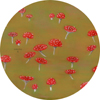[Udacha]
Functionality, used in the context of dance music, is a difficult concept to assimilate. The engaged listener of house or techno expects — or is expected to expect — more from accomplished tracks than simple dance-floor efficacy, to be able to offer praise more articulate than “This is dope.” But regardless of critical credo or purported cultivation in the field, it becomes all too easy to dismiss one’s criteria for a great tune, to an extent, when hearing it played in situ, on a large system in a room full of moving bodies. One is less likely to mind a Moodymann imitation or by-the-numbers piano house after taking pains to put herself in a place where dancing is the objective. Functionality, employment of the tried and true tropes of dance music, is fluid in its aptness. The expressly ineffectual, then, might move along a similar spectrum, which brings us to latest from Alexey Kalik, co-head of the Russian label Udacha.
Udacha traffics in the dreamier elements of deep house — noodly keys, warm pads, gauzy strings — and tends toward a general feeling of looseness in composition (see especially Dices’ “Confuse” or Dada Ques’ “Outerealmer”) while maintaining a level of propulsion that makes them suitable for club use, even if it’s in a early-doors vein. The more meandering pieces tend to readily announce themselves as such, but here Udacha 8 is aberrant, its five tracks lacking not in drive but in much else to offer the listener trying to parse a groove from it. The first track, “Entry Procedure” is true to its name, its consistent thump and white noise resembling a tunnel car wash made to ready a vehicle for its subsequent drive, which begins in a “Space Bus.” The tune has the general ambience and ticking hats familiar to those who know A5’s other work on Udacha, but what opens up sounding like it has the potential to jack quickly announces its other intentions as its bewildering low-end enters the mix. The bass line sounds as though Kalik has again recruited his cat, but only to record it practicing a descending scale — a bewildering device that distracts from the song’s more lively elements. “Aijawaska” works similarly, its peppy beat continually climbing to a release that does not arrive, despite the periodic addition of more percussion and some very lovely chord permutations.
“Whirligig,” based around a swirling Salsoul-esque piano line, is the first track on the EP to have something resembling swing, but like “Aijawaska,” it remains a closed whole. The only component that escapes the very tight structure of the seven-beat loop is the delay-soaked piano that becomes increasingly disconnected from its source. The basic rhythms of the track persist, as does the snare hit that very closely resembles the “Move to Trash” noise in a Mac OS — certainly not the most potent of percussive options. Even a cursory look into A5’s catalog makes it clear that these turbid tracks are not the result of incompetence, for the inaugural Udacha release and his output on Rawax make plain that he can concentrate his loose sensibilities into very functional pieces. Udacha 8 offers up a conversation about what in dance music doesn’t work and whether these more difficult aesthetics can be used in a way that can inspire some repositioning of tastes, if not of feet.














